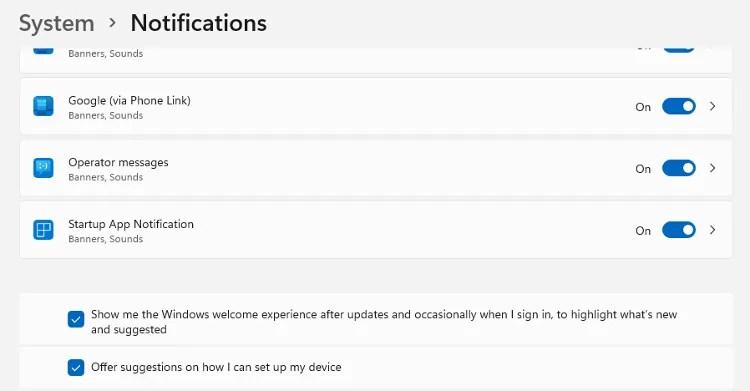How to Get Notifications When New Startup Apps Are Added to Windows 11
You probably have a few apps that open by themselves when you boot up your Windows 11 machine. These are called “startup apps” and they can minimize the time it takes for you to get set up for the day.
However, sometimes programs like to add themselves to the startup list without your permission. As such, here’s how to set up notifications when a program registers itself on the startup list on Windows 11.
How to Enable Startup App Notifications on Windows 11
Fortunately, dedicated startup app notifications are a built-in Windows 11 feature. They are not available on Windows 10, but this feature may be included in a future update.
You will receive a notification every time an app is added to the Startup list. This will pop up as a floating notification and will also be added to the Notification Center. You can quickly open the Notification Center by pressingWin + N.

If you want to be able to manage startup apps in Windows 10,using Autorunsis an interesting option.
How to Manage the Startup App Notifications
Like any other Windows 11 notifications, you could change the display settings for Startup App Notifications.
If you’d like to learn more, check out our guide oncustomizing notifications in Windows 11.

How to Disable Startup App Notifications
We have explored why having Startup App Notifications enabled is a good idea. But if you no longer want to be notified, you can easily disable the option in Settings > System > Notifications.
As an alternative to disabling Startup App Notifications, consider changing the notification settings to make them less intrusive.

Can Startup Apps Affect Performance?
Yes, they absolutely can! Monitoring and managing your Startup Apps is one of the easiest ways of reducing boot time. And beyond the boot sequence, having too many apps loaded in the background can put a strain on system resources.
Apps automatically loading when you boot your computer is an integral part of making Windows easy to use and convenient. Sometimes it’s obvious that an app will load and run when the computer starts, but sometimes it isn’t. Enabling Startup App Notifications lets you keep track more easily.

Of course, a few apps running in the background might not be the only reason for your computer’s poor performance. Here are a few quicktricks to speed up Windows 11.
How to View All Currently Enabled Startup Apps
There are multiple ways to view anddisable the apps launched on startupin Windows 11. Here are two of the easiest ways to see your Startup Apps.
Open the Settings app and navigate to Apps > Startup. This page contains a list of apps and switches to disable them when starting up. It doesn’t show the individual processes those apps might use, nor any other details.
To see a more detailed list of Startup Apps, press the Ctrl+shift+Esc keys to open the Task Manager. Click the Startup tab to see a more detailed list of apps, which includes their impact on the start-up process.
Keep Track of Your Windows 11 Startup Apps
Windows 11 makes it easy to monitor apps that load on start-up with Startup App Notifications. Doing so enables you to better control the use of precious system resources, keep boot times low and prevent unexpected software conflicts.
Computer booting slowly? You probably have too many programs running at startup. Learn how to disable startup programs on Windows.
My foolproof plan is to use Windows 10 until 2030, with the latest security updates.
Not Linux, not Windows. Something better.
I found my TV was always listening—so I shut it down.
These are the best free movies I found on Tubi, but there are heaps more for you to search through.
Who asked for these upgrades?